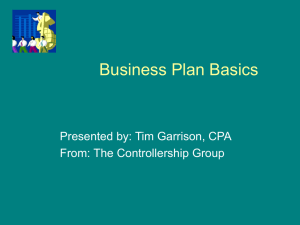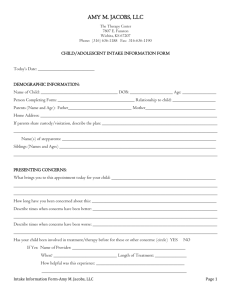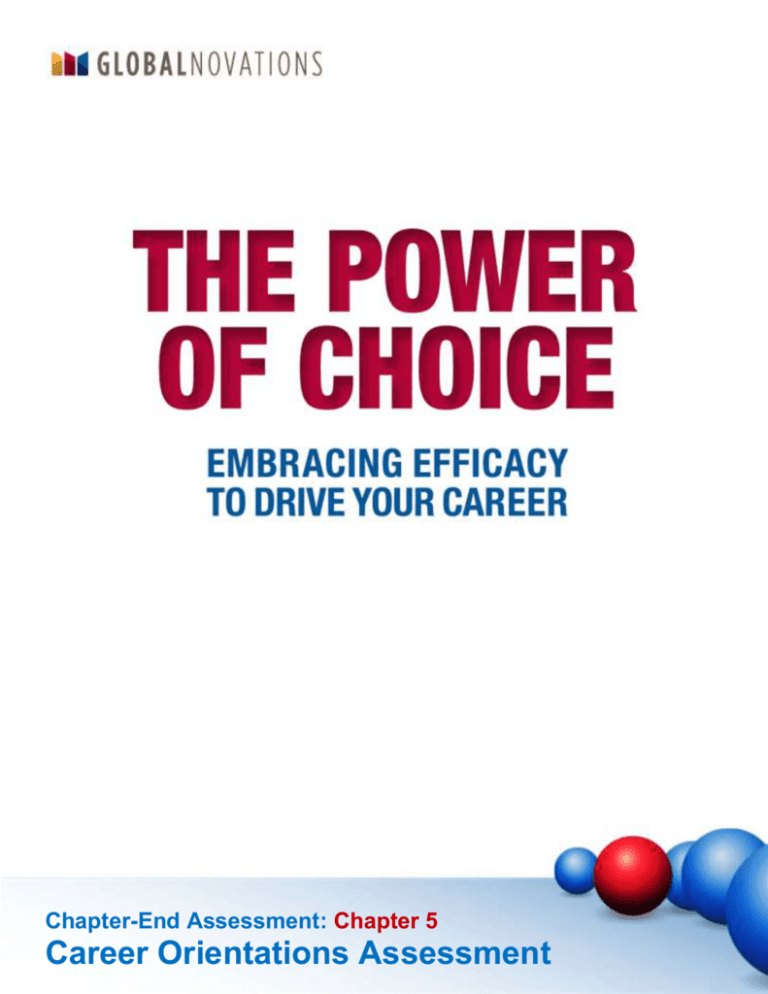
Chapter-End Assessment: Chapter 5
Career Orientations Assessment
Career Orientations Assessment
© 2011 Global Novations, LLC
All rights reserved. Printed in the United States of America.
This Discussion Guide may be reproduced for personal non-commercial or internal use. This is a license and not a
transfer of title, and the Discussion Guide may not be reproduced, modified in any way, nor used for any commercial
purpose, including but not limited to, public display, performance, sale or rental.
888.652.9975
www.globalnovations.com
www.powerofchoice.net
©2011 Global Novations, LLC. All rights reserved.
2
Career Orientations Assessment
Chapter 5
MAKE YOUR
EFFORT EFFECTIVE
Career Orientations Assessment
Your willingness to commit the effort required to engineer a satisfying career is influenced by your individual
talents, values, and motives. The following survey of 30 questions is designed to help you identify and
understand what drives your effort.
Each item contains two statements. Choose the one you feel most accurately describes you or is more true of
you. You must choose one of the statements, even though you may not like either or you may like both of
them. Do not skip any pair of statements or circle both alternatives in one set. Circle the letter corresponding to
the one sentence you select as the most reflective of you. Do not spend a lot of time weighing your answers.
Circle one letter in each pair.
1.
2.
3.
4.
5.
6.
7.
8.
9.
I like to organize myself and others to win.
V
I like to do my own thing in an organization.
X
Work must be balanced by time for leisure and the development of significant relationships.
Y
Personal needs must be subordinated for me to get ahead.
V
I would like to work in an organization that rewards hard work, loyalty, and dedication.
W
I like setting my own goals and accomplishing them at my pace and in my own way.
X
I am aggressive and have good analytical and people skills.
V
I am able to keep a good perspective between the needs of my work and the needs of my family and
friends.
Y
I want to work independently.
X
I like being a company person.
W
I enjoy working as a consultant or “trouble shooter” and getting turned on by an exciting project.
Z
I enjoy working in a situation where I am the leader and am responsible for achieving certain
objectives.
V
My relationships outside of work are as important to me as my career.
Y
My relationships outside of work take a back seat to my work when I am in the middle of a very exciting
project.
Z
The most important thing to me is freedom.
X
The most important thing to me is maintaining work/life perspective.
Y
I am competent, loyal, trustworthy, and hard working.
W
I am politically skillful, a good leader, and a good administrator.
V
©2011 Global Novations, LLC. All rights reserved.
3
Career Orientations Assessment
I can be described as:
10.
11.
12.
13.
14.
15.
16.
17.
Self-reliant.
X
Balanced.
Y
One who gets “turned on” by exciting projects.
Z
One who likes to be his/her own boss.
X
In equilibrium, but divided.
Y
Adventurous and competitive.
Z
Self-reliant, self-sufficient.
X
Imaginative and enthused.
Z
Stable and tenacious.
W
Independent and self-directed.
X
One who plans and organizes extremely well.
V
One who analyzes situations and develops creative new solutions.
Z
An expert in my field.
Z
A solid citizen.
W
Able to modify my own goals to accommodate organization goals and leaders.
W
Intent on finding a way to make the organization’s goals and my own personal goals converge.
Y
A personal goal is to:
18.
Control my own destiny.
X
Not let my work interfere with the needs of my personal life.
Y
It is important to:
19.
Have a job where there is security and a sense of belonging.
W
Be able to devote time to family and other personal activities.
Y
I prefer:
20.
21.
22.
23.
A career with potential for promotions.
V
The opportunity to tackle challenging problems or tasks.
Z
I like being at the center of influence.
V
I value long-term employment, acceptance, and being valued by the organization.
W
I view knowing the right people and making the right friends as important to career advancement.
V
I view being able to develop my career along my own areas of interest as the critical factor.
X
The bottom line for me is gaining a sense of balance between work and private life.
Y
The bottom line for me is stability, appreciation, and having a secure place in the organization.
W
©2011 Global Novations, LLC. All rights reserved.
4
Career Orientations Assessment
24.
25.
26.
I would like a position with maximum self-control and autonomy.
X
I would like to be in the inner circle.
V
The bottom line for me is stability, appreciation, and secure place in the organization.
W
The bottom line for me is advancing up in the organization.
V
I view financial success and increased power and prestige as important measures of career success.
V
I view success in my career as having equal time for work, personal relationships, and selfdevelopment.
Y
I would rather:
27.
Excel in my field.
Z
Be considered dependable and loyal.
W
I prefer:
28.
29.
30.
Working with a team on a long-term and steady basis.
W
Working with a task force or project group on a fast-paced and short-term basis.
Z
Professional development and continued training are important for their own sake.
Z
Professional development is important as a means to an end of becoming an expert and gaining more
flexibility and independence.
X
The bottom line for me is to seek equilibrium between personal and professional life.
Y
The bottom line for me is excitement and stimulation.
Z
©2011 Global Novations, LLC. All rights reserved.
5
Career Orientations Assessment
Your Career Orientation Profile
Once you have completed the questionnaire, go back through it, and add up the number of times you circled
the letter “V.” Then do the same with each of the other letters, writing the number in the space provided below.
If you have completed the test accurately up to this point, the grand total will be 30 (V + W + X + Y + Z = 30).
Advancement
SCORE:
V=
Security
W=
Freedom
Balance
Challenge
X=
Y=
Z=
Finally, plot your score:
INTENSITY
12
11
Strong
10
9
8
7
Average
6
5
4
3
Weak
2
1
0
Advancement
Security
©2011 Global Novations, LLC. All rights reserved.
Freedom
Balance
Challenge
6
Career Orientations Assessment
Leveraging Your Career Orientations
To the extent that you can structure your career so that your effort is oriented toward those characteristics that
are most likely to align with your values and interests, the more likely you are to be motivated to invest the
effort required to sustain your career mastery and mobility.
Advancement
This upwardly mobile career orientation is usually associated with advancing up a hierarchy of positions or a
status system. More influence, prestige, and financial remuneration are usually bestowed with each upward
move. Individuals pursuing such a strategy are most often found in large organizations or professional
associations. Many executives and status-conscious professionals follow this career orientation.
Security
Some persons are driven by loyalty, organizational identity, and the desire for a sense of order. In return for
dedicated, hard-working service, they seek long-term employment, benefits, recognition, and appreciation from
the employer. In the best situations, mutual respect and reciprocity characterize the relationship. These people
often seek steady promotions and advances as a symbol of their value and worth. Many who pursue careers in
large and secure organizations are pursuing this internal career orientation.
Freedom
Instead of moving upward in career direction, the careerist following this strategy seeks to move out toward the
margin. The emphasis is on gaining personal autonomy, “space,” loose supervision, and responsibility for
outcomes rather than being bound by another’s process, norms, and rules. Individuals are willing to work very
hard, often as professionals or small business persons, for conditions assuring more independence and selfcontrol. Interesting and exciting work is important and usually accompanies such an orientation, but individual
freedom is the ultimate objective.
Challenge
Some careerists are driven by the need for excitement, risk, and the engaging process of work. In such a
career, one seeks to move— often laterally—to the centers of action, adventure, and creativity. The
organizational setting may be large or small, but bureaucracy tends to be a constraint. These craftspersons,
technicians, entrepreneurs, and artists, like those opting for an Advancement or Freedom orientation, find it
difficult to separate themselves from their work. While autonomy may be an important component of the
Challenge orientation, the bottom line is exciting work.
Balance
Some people seek to balance their work, relationship, and self-development lives. For these individuals, work
is just one important dimension of a total lifestyle orientation, even though such careerists may emphasize
different dimensions at different seasons and given different pressures. Like the Freedom strategy, this career
orientation requires considerable flexibility. Unlike the Freedom orientation, it seeks balance and these
careerists try to separate themselves from their work. Many talented two-career couples, geographically bound
persons, and personal growth-oriented individuals fall into this category.
©2011 Global Novations, LLC. All rights reserved.
7
Career Orientations Assessment
Global Novations is an international management consulting firm specializing in leadership development, talent
management, and market expansion. It helps the world’s leading organizations accelerate the achievement of their business
objectives with consulting, training, measurement, and interactive solutions. Global Novations has partnered with more than
half of the Fortune 100 companies to improve the performance of hundreds of thousands of professionals worldwide.
©2011 Global Novations, LLC. All rights reserved.
8

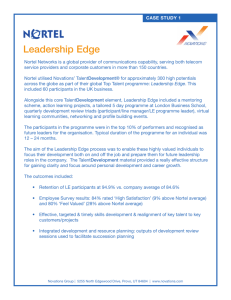
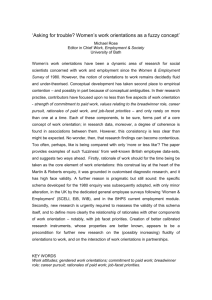

![Your_Solutions_LLC_-_New_Business3[1]](http://s2.studylib.net/store/data/005544494_1-444a738d95c4d66d28ef7ef4e25c86f0-300x300.png)
